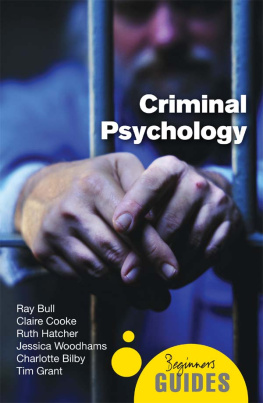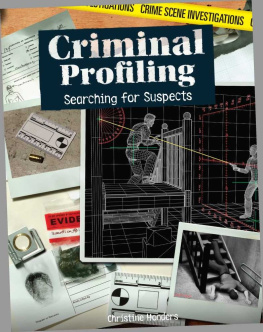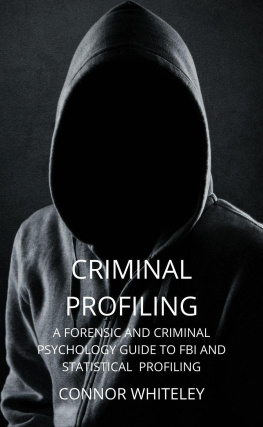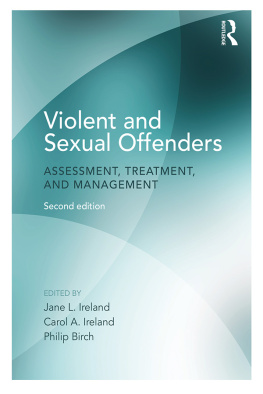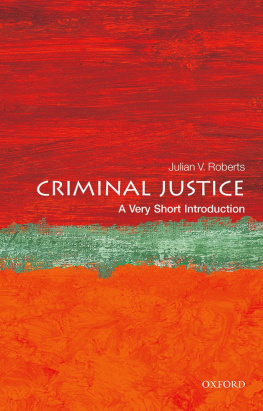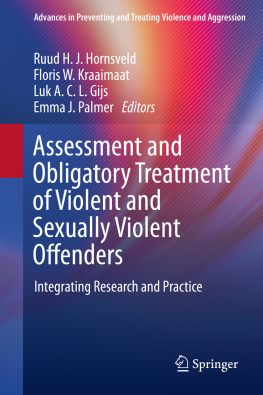Criminal Psychology
A Beginners Guide
ONEWORLD BEGINNERS GUIDES combine an original, inventive, and engaging approach with expert analysis on subjects ranging from art and history to religion and politics, and everything in between. Innovative and affordable, books in the series are perfect for anyone curious about the way the world works and the big ideas of our time.
anarchism | forensic science |
artificial intelligence | french revolution |
the beat generation | history of science |
biodiversity | humanism |
bioterror & biowarfare | islamic philosophy |
the brain | journalism |
the buddha | lacan |
censorship | life in the universe |
christianity | machiavelli |
civil liberties | mafia & organized crime |
classical music | marx |
cloning | medieval philosophy |
cold war | middle east |
crimes against humanity | NATO |
criminal psychology | oil |
critical thinking | the palestineisraeli conflict |
daoism | philosophy of mind |
democracy | philosophy of religion |
dyslexia | philosophy of science |
energy | postmodernism |
engineering | psychology |
evolution | quantum physics |
evolutionary psychology | the quran |
existentialism | racism |
fair trade | the small arms trade |
feminism | sufism |

Criminal Psychology
A Beginners Guide
Ray Bull, Claire Cooke,
Ruth Hatcher, Jessica Woodhams,
Charlotte Bilby and Tim Grant

A Oneworld Book
First published by Oneworld Publications 2006
Reprinted 2009, 2010
This ebook edition published by Oneworld Publications 2011
Copyright R. H. Bull, Charlotte Bilby,
Claire Cooke, Tim Grant, Ruth Hatcher,
Jessica Woodhams, 2006
All rights reserved
Copyright under Berne Convention
A CIP record for this title is available
from the British Library
ISBN 9781780740133
Typeset by Jayvee, Trivandrum, India
Cover design by www.fatfacedesign.com
Oneworld Publications
185 Banbury Road
Oxford OX2 7AR
England
Learn more about Oneworld. Join our mailing list to find out about our latest titles and special offers at:
www.oneworld-publications.com
Preface
Criminal psychology covers a range of fascinating topics. For centuries people have been very interested in crime, and in the last hundred years psychology has grown from a fledgling discipline to one of great importance. In several countries around the world (e.g. the USA, the UK), psychology is now among the top three most popular subjects to be studied at university or college.
It is now recognized that psychology is highly relevant to many aspects of life, especially those to do with offenders, prisons, the police, witnesses and the courts. This book has been written for members of the general public who wish to have a better understanding of criminal psychology than that which can be provided by the popular media such as newspapers and television. In this book we have explained in a reader-friendly way the research (and theory) which underpins modern criminal psychology. Thus the book will also be of interest to those commencing their studies of criminal psychology (e.g. in college or the final years of school).
We authors of the book have used everyday language to explain the many facets of criminal psychology. We have described the complexity of the issues and explained why, therefore, there are rarely simple answers or rules regarding criminal psychology (e.g. why harsh punishment may not reduce offending, that liars may not look away when deceiving you, that coercion may not produce reliable confessions).
The contents of this book would not have been possible without the help of all those people around the world who have participated in the thousands of relevant psychological studies. We would like to thank the police officers, witnesses, victims, offenders, prison officers and others who have given up their time, often in very difficult circumstances, to make a contribution. We would also like to thank Julie Blackwell-Young for her assistance with chapter eight and Aimee Jones for, among other things, collating the chapters.
Ray Bull
Criminal psychologists: within which settings do they work?
Introduction
If you were asked the question What do criminal psychologists do in their everyday working life?, what would you answer? If you were to believe the latest television dramas you might think that the main role of criminal psychologists involves helping the police to catch criminals or engaging in the profiling of offenders. If, however, you had watched films such as The Silence of the Lambs, then you might believe that criminal psychologists attempt to gain a better insight into the minds of serious offenders by talking to convicted offenders about their crimes, like the chilling interviews conducted by Clarice Starling.
These popular conceptions of the work of criminal psychologists, while they may be true for a small number, do not represent the wide variety of roles that those trained in criminal psychology can, and do, work. From assisting the police in investigations, providing advice on interviewing of suspects or witnesses, working as expert witnesses in court cases, working in the rehabilitation of offenders, conducting criminal psychology research or working in academia, the work of criminal psychologists is varied and wide reaching.
This chapter aims to present a balanced view of the profession of criminal psychology and to introduce the reader to the variety of roles within which criminal psychologists can, and do, work. It will guide you through the criminal justice process and provide a brief overview of how criminal psychologists may contribute their expertise at each stage. Further and more in-depth information can be found in the following chapters.
Next page
